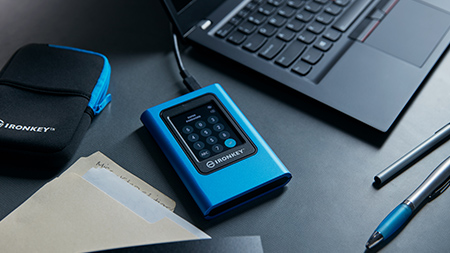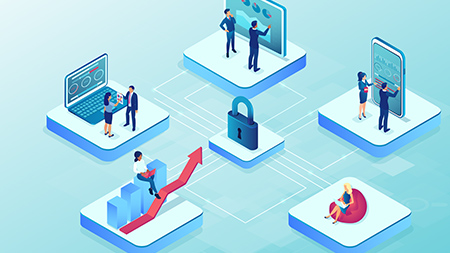Ask an Expert
Planning the right solution requires an understanding of your project's security goals. Let Kingston's experts guide you.
Ask an Expert
At Kingston, we’re monitoring high-profile data loss incidents. To protect proprietary company information, all businesses handling sensitive data need to put a data loss prevention (DLP) strategy in place. Our own Rich Kanadjian recently wrote about DLP strategies in this Dark Reading article.
As companies adjust to the hybrid workplace and adapt how they store, manage, and move sensitive data, companies must update their DLP software frequently and use data protection products like Kingston IronKey’s hardware-encrypted USB and External SSD storage to deter cybercrime. The best DLP strategy protects the company’s customers, employees, and data operations.
Here are the three key practices that Kingston recommends for businesses looking to cultivate a robust DLP:

Once businesses have identified the most sensitive and specific types of data, employees should back up that information under secure protocols. Doing so protects against file corruption and accidental file deletion. Backing up the most critical information also leaves the company less vulnerable to extortionists who may try to hold the data for ransom. For storing and transferring data securely, there are several options, but for many, it starts with hardware-encrypted storage like the IronKey Vault Privacy 80 External SSD.

The hybrid workplace has drastically increased data vulnerability. No employee is perfect, and threats from bad actors loom everywhere. Even the most successful team member can fall victim to a successful phishing attempt or accidentally leave a password written in plaintext. Other miscues from staff that increase threat exposure include accessing sensitive data on unsecured public Wi-Fi, such as networks at coffee shops or hotels, and using USB drives that are not hardware-encrypted. These examples are common: when employees unwittingly expose their organization’s data to bad actors, companies suffer the consequences.
Therefore, security leaders must empower all people in their organization to play an active part in safeguarding the company against data loss or theft. Consistent updates on cybersecurity risks and frequent training of the workforce help cultivate stronger defenses against cyber attacks. Kingston IronKey hardware-encrypted drives provide strong protection against theft or losses when employees carry their sensitive data on them.

Inevitably, breaches, hacks, and data loss incidents are going to strike. Having the right plan or tools in place can mitigate the damage. Measures such as a data recovery process, remotely revoking access to shared storage solutions, promptly notifying employees or customers of a vulnerability, and even alerting the proper authorities or customers to stolen data are all means of harm reduction for data loss. Maintaining best practices can significantly reduce the likelihood of successful attacks, but the threats still linger – and it is imperative to have a course of action to take when these situations occur.
Kingston IronKey products are designed with DLP strategies in mind so that when the eventual breaches happen, companies that use our technology are already in the best position possible to mitigate the attack. While every company needs a DLP designed for its specific business needs, all DLPs should be deployed with the same goal: preventing data breaches and securely maintaining personal and professional data, whether at-rest or in-transit.
Learn more about how Kingston helps companies achieve data security.
#KingstonIsWithYou #KingstonIronKey

Planning the right solution requires an understanding of your project's security goals. Let Kingston's experts guide you.
Ask an Expert